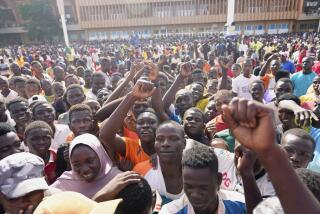Moment of Truth in Nigeria
- Share via
The announcement by a uniformed general that democratic elections will be held next year in Nigeria can only be looked upon with suspicion by a populace long repressed by military dictatorships. But political optimism dies hard; Gen. Abdulsalam Abubakar’s promise of transition to civilian rule set off a whirlwind of hope and party-building.
Now comes a test that is crucial to most Nigerians: whether the nation will move toward the democracy that became possible with independence in 1960 or slip further into the corruption that accompanied the development of great oil wealth. Certainly none of Britain’s former African territories achieved self-rule with greater promise. But ethnic wars, military regimes and rapacious greed had made the country a sorry gangster state by the late 1980s, and hard repression of democratic movements was standard until the death of the dictator Gen. Sani Abacha last month.
If Abubakar has the future of his country at heart he will deliver on his promise of free elections next spring and a return to civilian rule in May. Abubakar already has dissolved five government-sanctioned parties that fronted for the generals.
The promised elections should be the springboard for a return to legitimacy and prominence for Nigeria, whose corrupt recent history has not diminished its clout and respect among Africans. Post-colonial Africa was built on the strong legs of Nigeria and Kenya, but both have wobbled since.
The focus now will be on Lagos, the Nigerian capital, which has shown itself capable of producing generals and letting the national economy go to ruin. A smart military would follow Abubakar’s decision and give civilians a fair chance at rule. They could hardly do worse than the generals, and a cleanly run Nigeria would be a prize for all of Africa.
More to Read
Sign up for Essential California
The most important California stories and recommendations in your inbox every morning.
You may occasionally receive promotional content from the Los Angeles Times.













